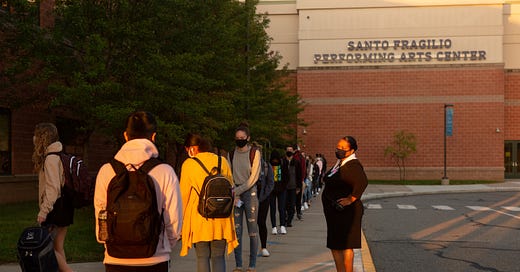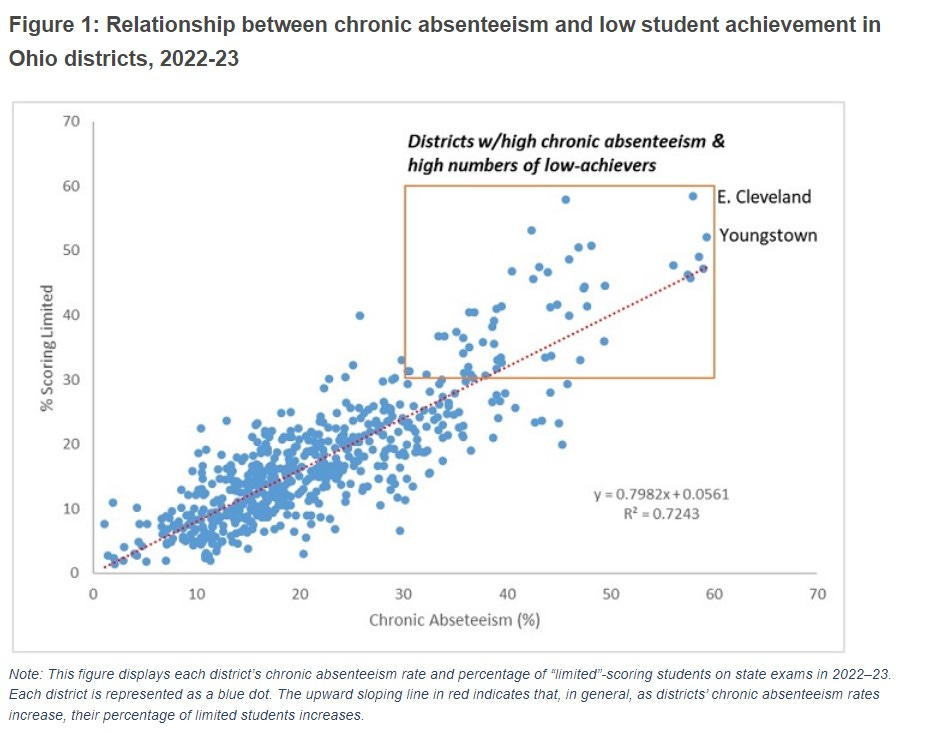The Education Policy Hotlist
Top news in U.S. education policy for the week of November 13th - 17th
It’s been a while since I’ve sent out a newsletter because Portland, Oregon, is experiencing its first-ever teacher strike. I’ve spent my free time poring over the district budget, comparing the county’s budget evaluation with similar districts, writing op-eds that never see the light of day, and brainstorming ways to create a space for families to understand, listen, speak, and heal.
But I feel isolated here because many parents who agree that students shouldn’t miss another school day are too scared to say it out loud. The union has drawn a bold, hard line: you join them on the picket line, honk your horn in support, or you are a teacher-hater. This false binary is unfair, unjust, and harmful in a city that claims to value equity, innovation, and student progress.
Yesterday, I took my kids to the library, and I heard a mom say she had hit a wall on Wednesday. I thought, “Me, too, girl, me too.” The difference is that I’ve spent the last three years focusing on pandemic response in schools. I’ve studied the impact of COVID-19 school closures on our future leaders' academic, social, emotional, mental, and financial well-being. I’ve seen how academic performance varies with the amount of school children missed during the pandemic. The evidence is clear that Oregon children should not have missed as much school as they did. Our state leaders chose complacency over accountability in 2021. Yet, our Portland teachers decided to send children back home again for more time away from learning and support.
So, while the mom in the library followed up her statement about exhaustion with, “… but I want clean, safe classrooms for my kids,” I thought differently because I know how the pandemic has affected our children’s prospects. We can’t afford to waste more time — not even an hour of missed learning — especially for our historically underserved students with limited resources and more significant barriers to quality learning time.
Unfortunately, the union’s messaging, data, information, and slogans are designed to make parents fall in line. They don’t allow us to question whether the union’s demands are worth the long-term fiscal instability they will create. As a teacher who started my career during the Great Recession, I am terrified of returning to a scarcity mindset regarding education funding. Because, sadly, students always come last in that scenario.
It’s time for Portland and other cities to engage parents in education decisions — not as a bloc or a bargaining chip — but as the diverse, empowered, and brilliant leaders they are. In the last month, I have been dismayed by how Portland parents have been used as pawns in a negotiation game. Even more so, I am heartbroken that there isn’t a space for parents to safely talk about what they need from our schools without a teacher or administrator setting arbitrary limits for their imagination. What do you imagine for your children? What experiences, successes, interactions, challenges, and growth do you envision for them?
In the last week and a half without school, I’ve seen the light fade from my kids’ eyes again — just like when they were sent home during the pandemic. I know that many families are going through something similar, and it is scary, and we feel alone.
I hope that Portland children will return to school next week and that the district and teachers will do everything to ensure their missed days don’t further affect their learning and connections. In the long run, many state leaders who could have pulled families into the light with accurate information and context chose political grandstanding and complicit silence instead. These actions and inactions inspire something powerful in me: A new call to action to let families know that they are not alone, that they have every right to accurate information about their children’s education and progress, and that there is room for their imagination to soar when it comes to their children’s future.
The passive-aggressive-progressive mindset that has consistently let Oregon children down, even since I was a student in Coos Bay, Oregon, must change immediately. We can transform education for Oregon children by establishing clear expectations, consistent and firm support, and a system for authentic accountability toward higher education quality and strong student outcomes. If there ever was a time for Oregon to imagine something new, it is now.
Mark Your Calendars
Are you seeking the latest and most relevant education research and policy events? Whether you prefer to attend them virtually or in person, you can find various options on FutureEd’s events page. FutureEd is a think tank at Georgetown University’s McCourt School of Public Policy that aims to advance excellence, equity, and efficiency in education.
Don’t miss this opportunity to learn from experts, network with peers, and stay updated on the most pressing issues in education. Visit FutureEd’s events page today and register for the events that interest you.
Engaging Students and Families
Biden-Harris asks Congress for billions to support the childcare sector
The Biden-Harris Administration requests $6.4 billion to support the childcare sector and help families afford high-quality care. This funding is essential to address the childcare crisis caused by the pandemic, which has resulted in the closure of many childcare providers, the loss of jobs for many childcare workers, and the increased burden for many working parents.
New federal grants for states to support students and families
The U.S. Department of Education announced a grant of more than $11 million to support parent education and family engagement programs in 13 states. The grant aims to improve children's academic and social outcomes from low-income and diverse backgrounds. The grant recipients will implement evidence-based practices and evaluate their effectiveness.
St. Paul School District Invites Public Input on Budget Decisions
The St. Paul school district in Minnesota is facing a $17.2 million budget shortfall for the 2023-24 school year and is asking the public to help prioritize spending and identify potential cuts. The district has launched an online survey and will host several community meetings to gather feedback from students, families, staff and residents. The survey asks respondents to rank 26 programs and services based on their importance and impact, such as academic interventions, athletics, magnet schools, social workers, and transportation.
Pandemic Learning Recovery
Nevada kindergarteners improve reading skills, but older students fall behind
A new review of MAP data from Nevada’s kindergarten through third-grade students in the 2022-23 school year revealed that while kindergarteners increased reading proficiency, first- through third-graders experienced a decline. The article also discusses the disparities among different subgroups of students, such as by race, ethnicity, and income.
Ohio’s test scores reveal widening achievement gaps
Ohio’s state test results for the 2020-21 school year show a mixed picture of learning recovery, with more students scoring at the highest and lowest levels than before the pandemic. The data suggest that some students thrived in remote or hybrid learning, while others fell further behind. The achievement gaps between different groups of students, such as by race, income, disability and English proficiency, also widened across most subjects and grades.
State test score results: California, Kansas, and Rhode Island
New data and analysis on the state test score results for California, Kansas, and Rhode Island for the 2020-21 school year compares the results with the previous year and highlights the trends and gaps among different subgroups of students. The state test score results for California, Kansas, and Rhode Island show that the COVID-19 pandemic hurt student learning, especially for the most disadvantaged students. The article also suggests that policymakers and educators must address the learning loss and achievement gaps by providing more resources, interventions, and support for the students who need them the most.
Quality and Accountability
The downside of grading leniency: How lower standards harm low-performing students
Aldeman examines the effects of a policy change in North Carolina that lowered the grading scale for high school students in 2014—using a quasi-experimental design to compare the outcomes of students exposed to the new, laxer standards with those not. The main takeaway is that the policy change negatively affected the lowest-performing students, who became disengaged, less likely to pass end-of-course exams, and scored lower on the ACT. Moving forward, honest feedback and high expectations are more beneficial for students than academic leniency.
The quality gap in elementary teacher reading licensure tests
A new study analyzes the elementary teacher reading licensure tests used by different states in the United States and evaluates their alignment with the science of reading. The research finds that most states (29 states and the District of Columbia) use weak tests that do not adequately measure teachers’ knowledge of the five core components of reading instruction: phonemic awareness, phonics, fluency, vocabulary, and comprehension. The main takeaway is that states need to adopt stronger tests that ensure that elementary teachers are prepared to teach reading effectively and that students receive high-quality reading instruction.
Teacher Workforce
Teacher intentions predict turnover behavior, school conditions matter
A recent study by Harbatkin and Nguyen examines how teachers’ intentions to leave their schools or the profession are related to their actual turnover behavior and school organizational conditions in Michigan. The study finds that teachers who report quitting plans are likelier to do so within three years. School leadership, collegial support, student behavior, and resources primarily drive teacher intentions and turnover. The study suggests that improving school organizational conditions can help retain teachers and reduce turnover costs.
Federal relief funds expiration could trigger massive teacher layoffs
A new analysis by Chad Aldeman estimates that schools could lose 136,000 teaching jobs when the federal COVID relief funds run out in September 2024. The study uses staffing ratios and enrollment data to identify the districts most at risk of layoffs, which tend to be large, urban, high-poverty districts that received the most ESSER money. The analysis also suggests some strategies to mitigate the impact of the looming budget crisis, such as using federal funds for one-time investments, improving teacher retention, and reducing pension costs.
Education Funding
Public school district finances in fiscal year 2021
The article presents data on public elementary and secondary education revenues and expenditures at the local education agency (LEA) or school district level for fiscal year (FY) 2021. The data are from the School District Finance Survey (F-33), a Common Core of Data (CCD) component. The article includes tables and figures that show the distribution and variation of revenues and expenditures across school districts, as well as the impact of the COVID-19 pandemic on school district finances.
ICYMI
Students demand a voice in shaping the future of education.
Our Turn released its updated Student Agenda, a set of policy recommendations developed by students from across the United States who are part of the Our Turn network. The agenda covers four areas: student voice and leadership, equity and access, mental health and wellness, and college and career readiness. Students are not passive recipients of education but active agents who can and should have a say in how their education is designed and delivered.
Dr. Christine Pitts is an executive leader advancing evidence-based public policy for social impact. Follow her on LinkedIn and Instagram for more updates.








